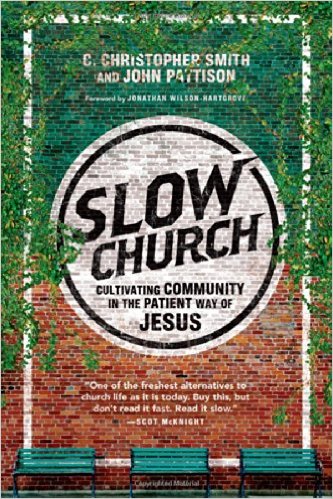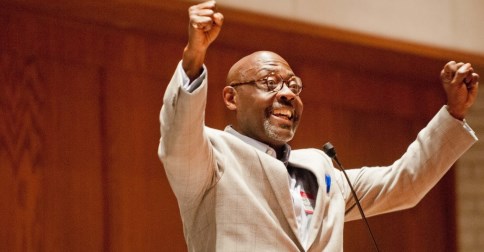
Amidst the deep polarization of our day, one of the most difficult instructions of Jesus is his call for those who follow him to love our enemies:
‘You have heard that it was said, “You shall love your neighbor and hate your enemy.” But I say to you, Love your enemies and pray for those who persecute you, so that you may be children of your Father in heaven; for he makes his sun rise on the evil and on the good, and sends rain on the righteous and on the unrighteous. For if you love those who love you, what reward do you have? Do not even the tax-collectors do the same? And if you greet only your brothers and sisters, what more are you doing than others? Do not even the Gentiles do the same?’ [Matt 5:43-47]
I would contend that in the twenty-first century our enemy is that person whose convictions (theological, political, socioeconomic, etc.) differ vastly from our own. Maybe persecution is too strong of a term in our day, but my enemy is the person who would call me names and demonize me (and likely, I would want to do the same to them).
Even among Jesus’s twelve disciples, there were likely enemies in the above sense. Simon was a Zealot, a Jew whose ideology was shaped by the desire to overthrow the Roman oppressors. On the other end of the spectrum was Matthew, a tax collector who worked with and on behalf of the Roman authorities.
Loving our enemies is undoubtedly as difficult as we might imagine it to be (or even more so), but it has to begin with knowing them – not simply knowing about them, and fleshing them out in our minds with all the pertinent stereotypes – but actually sitting down and listening to them. My experience has been that as we get to know them every person is more complex than the initial stereotypes by which we perceived them.
Additionally, the best way to begin the work of loving our enemies, I believe, is in real, embodied relationships, and especially in our churches. It’s easy to demonize someone that you are not spending face-to-face time with. It’s much harder to do so when you see the pains and anxieties that undergird their convictions, and shape their tone and demeanor. I emphasize starting with those in our churches, because like Simon and Matthew, we are bound together in Christ’s body by our mutual calling to follow Jesus in this particular community of faith. This bond should compel us to at least attempt the hard work of loving those who are most at odds with us.
Gerald Schlabach, in his insightful book Unlearning Protestantism, observes that we in the Protestant world have inherited a fractious way of being; the cumulative effect of our emphasis on “prophetic critique and reform” (Tillich) over the last 500 years has been an increasingly narrow existence that is near impossible to sustain. Schlabach doesn’t think that we should all convert to Catholicism, but does emphasize that Protestants will need to learn practices of stability and loving our enemies that cultivate in us the virtue of fidelity (“the virtue that keeps us together even when we’re pissed off at each other”) or we will splinter into oblivion.
The supreme difficulty, of course, in loving our enemies is the real or perceived threat that our enemy – or ones with whom they affiliate themselves – poses to me or those who are dear to me. I don’t want to diminish the significance of this sort of threat, as it will have to be addressed at some point, but we can abide better with these threats when we remember two things. 1) The real threat may not actually be as intense as the perceived threat, and we won’t know what the real threat is until we spend time talking with and getting to know our enemy. 2) We should never underestimate the transformative work of the Holy Spirit. Even if there is a real threat now, our enemy may be transformed by the encounter with the Spirit at work in the lives of those who differ from them. It seems to me that Jesus’s instruction to “judge not, lest you be judged,” (Matt. 7:1-3) is a caution never to condemn or permanently write someone off, as outside the scope of God’s transforming work. I know that I, for one, am neither the conservative evangelical nor the fiercely anti-authoritarian anarchist that I was in earlier eras of my life.
So how do we start to love our enemies? Let’s start in our churches. (Or if you aren’t committed to a church, a first step in loving your enemy would be to commit yourself to one, even if there are things that you don’t agree with – and there will certainly be these contentious things in any person-church pairing!) Look around the church. Who is the person who differs greatly from yourself – in age, race/ethnicity, class, gender, political ideology – or with whom you often find yourself at odds? Take that person out and buy them lunch (or coffee or a round of drinks). Practice the wisdom of the Apostle James, of being “quick to listen, slow to speak, and slow to become angry” (James 1:19). After the initial get-together, find ways to continue the conversation, to continue to get to know this person. Seek a variety of opportunities to serve, to work, and to talk with this person.
YES, it is most certainly going to be difficult and uncomfortable, maybe even outright painful at times, but if we only know and work with those who are like us, what good is that? As Jesus emphasizes anyone can do that, but the way of Jesus is the way of costly discipleship of working to love those who don’t love us in return.
Loving our enemies orients us toward the hope of God’s transformation, transformation of our enemies, but also the transformation of ourselves. It is at the heart of Christian discipleship, and is perhaps the practice most needed for Christian faithfulness amidst the intense forces of polarization in our day!






![Book Giveaway – Reading For the Common Good [3 copies]](https://slowchurch.com/wp-content/uploads/2017/05/RFTCG-Cover-Banner.jpg)



One Response
Susan Adams
A great invitation for Christians to slow down, quiet down, and sit down with those whom we too easily and too quickly categorize as “enemy.” It would be fun to co-write a spot with you on how we can agree to stay together at the table in the midst of so much disagreement. Invite me!